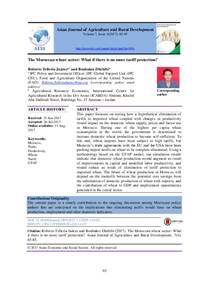The Moroccan wheat sector: What if there is no more tariff protection?

Authors:
This paper focusses on testing how a hypothetical elimination of tariffs to imported wheat coupled with changes in productivity would impact on the domestic wheat supply, prices and factor use in Morocco. Having one of the highest per capita wheat consumption in the world, the government is determined to increase domestic wheat production to become self-sufficient. To this end, wheat imports have been subject to high tariffs, but Morocco’s trade agreements with the EU and the USA have been pushing import tariffs on wheat to be complete eliminated. Using a methodology based on the GTAP model, our simulation results indicate that domestic wheat production would augment as result of improvements in capital and unskilled labor productivity, and would reduce as result of elimination of tariff protection to imported wheat. The future of wheat production in Morocco will depend on the tradeoffs between the potential cost savings from the substitution of domestic production of wheat with imports, and the contribution of wheat to GDP and employment opportunities generated in the cereal sector.
